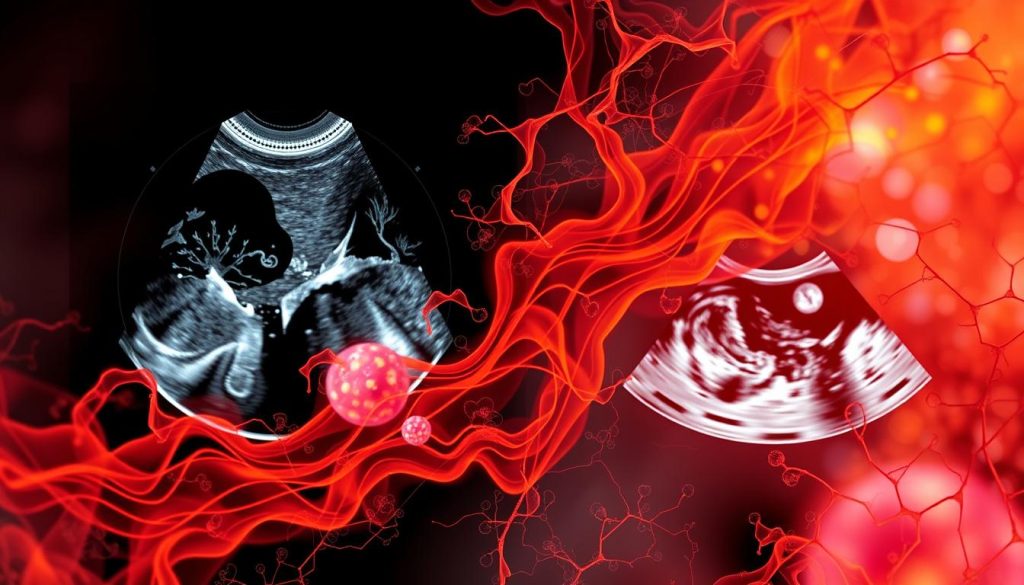Being aware of breast cancer is crucial for early detection and treatment. Lobular breast cancer is a type that starts in the milk-producing glands. It’s important to know about lobular breast cancer symptoms, its forms, and lobular cancer treatment options.
Spotting symptoms early can lead to better treatment outcomes. Learning about these topics empowers people with important information. It also gives them the tools to act quickly against this serious disease. This article will explore lobular breast tumor characteristics and treatment options.
Key Takeaways
- Insight into the distinct nature of lobular breast cancer compared to other breast malignancies.
- Recognition of the symptoms associated with lobular breast cancer for early detection.
- An overview of lobular cancer treatments, emphasizing the variety of options based on individual diagnoses.
- A deeper understanding of the types of lobular breast cancer and its progression stages.
- The importance of identifying lobular breast tumors and the implications for personal health and treatment planning.
Understanding Lobular Breast Cancer
Lobular breast cancer grows in the lobules, where milk is made. It’s a special type of breast cancer. This section explains what lobular carcinoma is and why it’s important to treat it differently.
The Basics of Lobular Carcinoma
Lobular carcinoma is a common type of breast cancer. It grows in a unique way, making it harder to find. Lobular breast cancer research is helping us understand it better. This research could lead to new treatments.
Comparing Lobular and Ductal Breast Cancer
It’s important to know how lobular breast cancer is different from ductal breast cancer. Ductal cancer is the most common type.
- Cell Origin: Lobular cancer starts in the lobules, while ductal cancer starts in the ducts.
- Physical Presentation: Ductal tumors are usually one solid mass. Lobular cancer is made up of smaller, harder-to-find growths.
- Detection and Diagnosis: Lobular tumors are hard to see on mammograms. This means doctors need to use other tests too.
Knowing these differences helps us improve how we find and treat lobular breast cancer. This is part of the ongoing lobular breast cancer research.
Identifying Lobular Breast Cancer Symptoms
Knowing the lobular breast cancer symptoms is key for early detection and treatment. Lobular breast cancer symptoms are often subtle and easy to miss. Spotting these signs early can greatly improve treatment results and survival chances.
Lobular breast cancer often grows quietly, making it hard to catch early. Here are the symptoms to watch for:
- Thickening or hardening in parts of the breast, which may not be accompanied by a distinct lump
- Changes in the skin over the breast, such as puckering or dimpling
- Inversion or retraction of the nipple that wasn’t previously present
- Swelling or a feeling of heaviness in the breast
- Vague discomfort or pain in the breast, not linked to the menstrual cycle
Experts say regular screening and noticing small changes in the breast are crucial. Lobular breast cancer doesn’t always show up as a lump, so these symptoms are important to watch for.
Early detection of lobular breast cancer opens up more treatment options and boosts survival chances. If you see any unusual changes or symptoms, see a doctor right away.
Remember, early stages of lobular breast cancer often present with indirect symptoms, challenging timely diagnosis. Vigilance is key in catching this elusive disease early.
Seeing a healthcare provider when symptoms appear can lead to quicker diagnosis and treatment. This is crucial for managing lobular breast cancer well.
Lobular Neoplasia: A Precursor to Cancer
Lobular neoplasia is often missed in breast cancer talks. It’s key to see it as a sign of cancer risk, not just a harmless growth.
What is Lobular Neoplasia?
Lobular neoplasia is abnormal cell growth in the breast’s milk glands. It’s mostly non-invasive but can lead to invasive breast cancer, especially lobular carcinoma.
Roles and Implications in Cancer Development
Finding lobular neoplasia early can warn of breast cancer risk. A study on the National Center for Biotechnology Information shows it’s linked to invasive carcinoma. This makes watching it closely and taking steps to prevent cancer very important.
- Watching lobular neoplasia closely can help catch and treat lobular carcinoma early.
- Knowing the genetics and biology of lobular neoplasia helps make treatments better.
- Changing lifestyle and taking steps to prevent cancer based on lobular cancer risk factors can lower the risk of invasive cancers.
Lobular neoplasia is more than just a harmless growth. It’s a critical part of breast cancer, showing a higher lobular cancer risk. Being careful and acting fast can turn its discovery into a strong defense against breast cancer.
Types of Lobular Breast Cancer
Lobular breast cancer comes in two main types: invasive lobular cancer (ILC) and Lobular Carcinoma In Situ (LCIS). Each type has its own set of challenges and treatment options. Knowing about these types is key to understanding breast cancer.
Invasive Lobular Cancer
Invasive lobular cancer is a more serious form of lobular breast cancer. It can spread to other parts of the breast and even the body. This type grows in single-file lines, making it hard to find with mammograms.
To treat invasive lobular cancer, doctors often use surgery. They might also recommend chemotherapy, radiation, or hormone therapy. The choice depends on the tumor and the patient’s health.
Lobular Carcinoma In Situ (LCIS)
LCIS is not a true cancer but a sign of higher breast cancer risk. It stays in the lobules and doesn’t spread. While it doesn’t need treatments like chemotherapy, it needs close monitoring.
People with LCIS should get regular check-ups and might take medicine to lower their cancer risk. Making healthy lifestyle choices and getting regular screenings are important.
It’s crucial to know the difference between invasive lobular cancer and LCIS. This knowledge helps doctors plan better treatments and educate patients. It aims to improve life quality for those with breast cancer.
Lobular Breast Cancer: Risk Factors and Prevention
It’s important to know the lobular cancer risk factors and how to prevent them. This part talks about what increases the risk and how to lower it.
- Genetic Factors: Genes like BRCA1 and BRCA2 can raise your risk. If your family has a history of breast cancer, get tested.
- Lifestyle Choices: Your lifestyle can help prevent cancer. Stay healthy, exercise, and eat lots of fruits and veggies.
- Alcohol Consumption: Drinking less alcohol can help too. Even a little can up your breast cancer risk.
- Hormonal Factors: Using hormone therapy for a long time can increase your risk. Talk to your doctor about safer options.
Regular check-ups are key to catching cancer early. This can lead to better treatment results. If you’re at high risk, you might need more mammograms or MRIs than usual.
“Prevention is powerful. By understanding personal risks and taking proactive steps towards reducing those risks, individuals can significantly impact their breast cancer outlook.”
- Go for annual health check-ups and talk about breast cancer risks with your doctor.
- Join regular screening programs that fit your risk level.
- Learn about and share the role of lifestyle in preventing cancer.
Using these prevention strategies can help lower lobular cancer risk factors. This protects your health and well-being.
Diagnostic Procedures for Lobular Breast Cancer
Getting a lobular breast cancer diagnosis involves many steps. Each step is designed to spot the early signs of this cancer. These steps are key for catching cancer early and planning treatment.

Mammography and Ultrasound
Mammograms are often the first step in checking for breast cancer. But, they might miss the small details of lobular breast cancer. That’s why ultrasounds are used too. Ultrasounds give clearer images of the breast tissue, helping doctors decide if more tests are needed.
Magnetic Resonance Imaging (MRI)
MRI is great for finding lobular breast cancer. It can see how cancer spreads in the breast. This is especially helpful in tricky cases where other tests don’t give clear results.
Biopsy Techniques
A biopsy is the surest way to confirm a lobular breast cancer diagnosis. Doctors use different biopsy methods, like core needle or surgical biopsy. These help pathologists check the cancer cells closely. This information is crucial for planning treatment.
Each diagnostic tool gives unique insights. They are often used together for a complete check-up. The choice of method depends on the patient’s situation and the findings leading to the diagnosis.
The Importance of Genetic Testing in Lobular Cancer Prognosis
Genetic testing plays a key role in understanding lobular cancer prognosis. It helps find specific genetic mutations linked to lobular breast cancer. This information is vital for making treatment plans that fit each patient’s needs.
Genetic testing is a crucial tool for understanding lobular cancer prognosis. It helps doctors predict how the cancer will behave. This leads to treatments that are more effective and tailored to each patient.
“Genetic markers are pivotal in the fight against lobular cancer, shifting our approach from generalized to personalized.” – Notable Oncology Expert
- Detailed analysis of genetic profiles
- Identification of high-risk cases
- Customizable treatment protocols based on genetic insights
Genetic testing also helps predict the chance of cancer coming back. It guides how often and how closely patients should be checked. This way, patients with lobular breast cancer can make better choices about their health.
Lobular Cancer Treatment Options
Looking into lobular cancer treatment shows a range of methods to fight this type of breast cancer. Each plan is made just for the patient, based on the cancer’s stage and type. This ensures the treatment works best and fits the patient’s health.
Surgery for Lobular Cancer
Surgery is key in treating lobular cancer. It might include lumpectomy or mastectomy, depending on the tumor’s size and where it is. Surgery aims to remove the cancer and figure out how far it has spread. This is important for planning further treatments.
Radiation and Chemotherapy
After surgery, radiation therapy might be needed to kill any cancer cells left behind. Chemotherapy is also used, especially if there’s a chance the cancer could come back or spread. These treatments aim to kill cancer cells and stop them from coming back.
Hormonal Therapy Treatments
Most lobular cancers need hormonal therapy because they grow in response to hormones like estrogen. Drugs like Tamoxifen or aromatase inhibitors are used to stop this growth. This treatment is crucial for keeping the cancer under control and preventing it from coming back.

Hormonal therapy is very effective in managing cancer over time. It’s important for patients to talk to their doctors about the benefits and side effects. This helps make sure the treatment fits their goals and quality of life.
Advances in Lobular Breast Cancer Research
The field of lobular breast cancer research is always changing. Scientists are making big steps in understanding and treating this cancer. They have been studying the molecular and genetic profiles of lobular breast cancer. This has led to new treatment innovation.
Recently, researchers have made big discoveries about how lobular cells work and react to treatments. This has opened up new ways to help patients. Advanced genomic technologies are key to these discoveries, giving us a better look at cancer’s complexities.
“The key to advancing treatment for lobular breast cancer lies in understanding its unique pathology and genetic makeup, providing a foundation for personalized treatment strategies.”
This ongoing research helps us find better ways to fight the disease. It also improves life for those dealing with it. The main goal is to not just treat but to cure lobular breast cancer.
- Investigation into new hormonal therapies and inhibitors
- Development of more precise diagnostic imaging techniques
- Enhanced patient-specific treatment plans
The progress in lobular breast cancer research brings hope for the future. It shows a move from just managing symptoms to possibly curing the disease. As research keeps going, the push for treatment innovation keeps patients hopeful.
Impact of Lifestyle on Lobular Cancer Risk and Recovery
Looking into how daily choices affect lobular breast cancer risk and recovery is key. Lifestyle factors are very important. They shape health outcomes for those with this cancer.
Role of Diet and Exercise
Eating right and staying active are big helpers in lobular cancer recovery. Eating lots of fruits, veggies, and lean meats boosts the body’s fight against cancer. Exercise keeps weight in check, lowering cancer risk.
- Eat more antioxidants from foods like berries and leafy greens.
- Make walking, yoga, or swimming part of your daily routine.
Influence of Alcohol and Tobacco Use
Drinking alcohol and smoking raise cancer risks, including lobular breast cancer. Cutting down or stopping can greatly help recovery and lower risk.
Less alcohol and no smoking can help you live longer and lower cancer coming back.

Knowing about these lifestyle factors helps people make better choices. These choices can lower cancer risk and aid in recovery. They help build a stronger body against lobular breast cancer.
Survivorship and Quality of Life Post-Treatment
Life after treatment for lobular breast cancer involves many changes. It’s about making physical and emotional adjustments. This shows how key lobular cancer survivorship and post-treatment quality of life are. Survivors work hard to stay healthy, manage side effects, and live well.
The move from treatment to care is crucial for survivors’ long-term health. Studies show that taking care of both body and mind helps a lot. This approach boosts the post-treatment quality of life.
- Regular check-ups to watch health and catch any signs of cancer coming back.
- Physical therapy to help with any function changes.
- Therapy and support groups for emotional healing.
- Advice on eating well to keep a healthy weight.
“Surviving cancer is not the end of a gruesome story; it’s the beginning of a beautiful one,” says one advocacy group dedicated to lobular cancer survivorship. This feeling of hope and strength is key for life after treatment.
Improving life for lobular cancer survivors means everyone working together. It’s about creating a supportive community. Knowing and understanding the challenges survivors face helps a lot.
The aim of lobular cancer survivorship programs is to help people live full lives. They aim to lessen treatment’s long-term effects and improve overall health. The help of survivors, families, healthcare teams, and communities is vital for this goal.
How to Support a Loved One with Lobular Breast Cancer
When someone you care about gets diagnosed with lobular breast cancer, your support can really help. It’s key to know how to offer emotional support and practical care and assistance. Here’s a guide to supporting lobular cancer patients well.

First, just being there to listen without judging is a big help. Cancer is a very personal journey. Sharing fears and thoughts can be comforting. Also, focusing on positive outcomes is important.
Remember, your presence and willingness to listen can be more comforting than you might realize.
You can also help out in practical ways. Going to doctor’s appointments or researching treatment options can be a big help. Helping with daily tasks or household chores can also reduce stress.
- Meal preparation
- Transportation to medical centers
- Help with medication schedules
- Child care arrangement if needed
Another important part of care and assistance is supporting their mental health. If they show signs of depression or anxiety, encourage them to talk to professionals. A support group can also offer a sense of community and understanding.
Lastly, learn about lobular breast cancer. Knowing about the condition helps you support better. You can ask informed questions at medical appointments and offer the right kind of help.
Supporting lobular cancer patients means more than just emotional support and practical help. It also means being patient and understanding as they go through treatment and recovery.
Lobular Breast Cancer and Mental Health
Getting diagnosed with lobular breast cancer can really affect your mental health. It’s important to have the right support and resources to cope. This part talks about the emotional challenges and the key resources for help.
Coping with a Lobular Breast Tumor Diagnosis
When you first hear you have lobular breast cancer, it can be shocking and scary. It’s a tough time for your mental health. Here are some ways to help you get through it:
- Educate Yourself: Learning about your cancer can make you feel more in control and prepared.
- Seek Support: Talking to others who have gone through the same thing can offer comfort and advice.
- Professional Counseling: Mental health experts can help you deal with your feelings in a healthy way.
- Mindfulness and Relaxation Techniques: Doing things like meditation and yoga can help you feel less stressed and better mentally.
Mental Health Resources for Patients and Families
It’s crucial to have access to mental health resources for both patients and their families. These resources aim to offer emotional support during the cancer journey:
- National Cancer Institute: They have detailed guides and support services for patients.
- American Cancer Society: They offer a helpline and online forums for those affected by cancer.
- Local Hospitals and Clinics: They often have social workers who can help with counseling and find community resources.
- Online Platforms: Digital support groups and communities are places to share experiences and find support from others.
By using these resources and finding effective ways to cope, people with lobular breast cancer can better manage their mental health. This helps them face the disease with strength and hope.
Navigating Health Insurance and Lobular Cancer Care
For those with lobular breast cancer, dealing with health insurance can be tough. It’s important to know how to use your benefits and understand cancer care costs. You should talk to your insurance provider to make sure your coverage fits your treatment plan.
Understanding terms like deductibles, co-pays, and out-of-pocket maximums is key. This helps you see what you might have to pay for treatments like surgery, chemotherapy, and radiation. These treatments can cost a lot, but insurance helps a lot. Still, knowing what’s not covered is crucial.
If you face high costs, look into financial help. Many groups offer grants and aid to those in need. This can make a big difference in managing treatment costs.
It’s also important to stay updated on laws that affect health insurance. In the U.S., the Affordable Care Act helps by covering essential health benefits without lifetime limits. Keeping up with these changes can help you get the most from your insurance during treatment.
FAQ
Q: What is lobular breast cancer?
A: Lobular breast cancer starts in the milk-making parts of the breast. It’s not as common as ductal cancer, which begins in the ducts. These ducts carry milk to the nipple.
Q: How do lobular and ductal breast cancer differ?
A: Lobular cancer starts in the lobules, while ductal cancer begins in the ducts. They grow differently and might need different treatments.
Q: What are the typical symptoms of lobular breast cancer?
A: Symptoms of lobular breast cancer can be hard to notice. You might feel a thickening or fullness in your breast. Changes in texture and areas that feel different are also signs.
Lumps are not as common in lobular cancer. This makes regular screenings very important.
Q: What is lobular neoplasia and how is it related to breast cancer?
A: Lobular neoplasia is a condition where cells grow abnormally in the lobules. It’s not cancer but can raise your risk of getting breast cancer later. So, it’s key to watch it and take preventive steps.
Q: Are there different types of lobular breast cancer?
A: Yes, there are two main types. Invasive lobular cancer can spread to other parts of the body. Lobular Carcinoma In Situ (LCIS) means abnormal cell growth that’s still in the lobules. It’s a sign you might be at higher risk for breast cancer.
Q: What are the risk factors for developing lobular breast cancer?
A: Several factors can increase your risk. These include age, family history, and certain genetic mutations. Your reproductive history, hormone therapy, alcohol use, and history of breast conditions like LCIS also play a role.
Q: What diagnostic procedures are employed for detecting lobular breast cancer?
A: Doctors use mammography, ultrasound, MRI, and biopsies to find lobular breast cancer. MRI is especially good at spotting lobular cancer, which can be hard to see on a mammogram.
Q: How can genetic testing influence lobular cancer prognosis?
A: Genetic tests can show mutations that affect treatment and outlook. Knowing your genetic makeup helps predict how likely you are to have the cancer come back. It also guides your treatment plan.
Q: What treatment options are available for lobular cancer?
A: Treatments for lobular cancer include surgery, radiation, chemotherapy, and hormone therapy. The choice depends on the tumor’s stage and type.
Q: What are some recent advances in lobular breast cancer research?
A: New research has led to better treatments and early detection methods. We now understand more about the hormonal and genetic factors that cause lobular cancer.
Q: How does lifestyle affect lobular cancer risk and recovery?
A: Your lifestyle can impact your risk of getting lobular breast cancer and how well you recover. Eating well, staying active, and avoiding alcohol and tobacco can help. These habits can also support your recovery.
Q: What can enhance the quality of life for lobular cancer survivors post-treatment?
A: Survivors can improve their quality of life by joining support groups and living a healthy lifestyle. Managing treatment side effects and regular check-ups are also important.
Q: How can I support a loved one with lobular breast cancer?
A: Supporting a loved one means being there emotionally and helping with daily tasks. Encourage them to follow their treatment plan and help with getting to appointments. Listening and advocating for their needs is key.
Q: How does lobular breast cancer diagnosis affect mental health?
A: Getting a lobular breast cancer diagnosis can really affect your mental health. It can lead to anxiety, depression, or stress. Using counseling, support groups, and mindfulness can help cope with these feelings.
Q: What should I know about health insurance and the costs of lobular cancer care?
A: Knowing your insurance and what you’ll have to pay out of pocket is crucial. Look into financial help programs for treatment costs. Understanding your policy can help manage the financial side of cancer care.


















